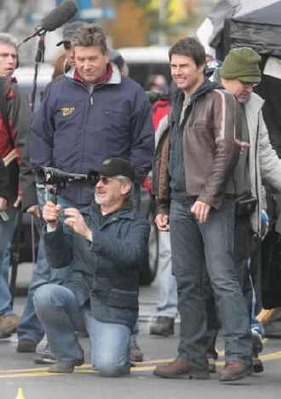Politics and art have always mixed badly in my head, but never as acutely as during a conversation during a New Year’s party I had with a politically correct Greenwich Village activist about Steven Spielberg.
Although overburdened with my own political opinions, I have always made a sharp distinction between my art and politics, and knew that when I crossed the line into ranting and raving, I made bad art.
For me, art has always been a kind of observation of the world, not an attempt to make it better (or worse).
Activists often misunderstand artists because we often share similar feelings about the plight of the poor and the injustice people suffer at the hands of progress, philosophic imposition and economic power. We artists (if you pardon my nerve for including myself in that collection) have often become involved in movements that attempt to alleviate these unjust conditions, attending protest rallies or sending money off to groups we trust have their hearts in their right places.
Activists, of course, believe we need to do more – especially those that have succeeded in their craft – and insist we use our talents and status to solve the world’s ills. This is something I frequently called the Jane Fonda, John Lennon or Phil Oakes syndrome for their ill conceived idea that fame could translate into political power – sending one to Vietnam in the height of the war, the other to send walnuts to world leaders in a gesture of peace and the third to dress up as Elvis Presley.
Many artists have tried; few have succeeded.
This is partly because artists tend to be observers and commentators of the world stage, not actors on it. We tend to paint pictures of the amazing interactions we see going on around us, not merely pointing out the flaws. Of course, the more successful we are in achieving an honest picture, the more our art also reflects the conditions of the world and its people.
Most artists are not saints. We do not strive to support great causes with our art, but driven by some inexplicable compulsion — some vision we cannot shake out of our heads or some idea that we must work out through our art that might accidentally serve the public good.
Some artists feel great guilt over the self-centeredness creation requires – that pure ego and self-belief that we need in order to carry on the creative process to its conclusion.
Some, particularly, those who succeed in the wide world, go to great lengths to pay back society in order to appease this guilt.
Activists sometimes see successful artists as a version of “Uncle Tom” as if we have somehow betrayed the public trust by creating a product that the general public is willing to buy, as if we needed to continue to starve in order to be acceptable. The more successful the artist, the more suspicious the activist becomes seeing us as somehow exploiting the public instead of serving it.
In the eyes of some activists, Spielberg, unfortunately, suffers from all of these syndromes. This activist I spoke to was particularly upset with Spielberg for filming “Batteries not included” in a still-poor section of Greenwich Village a decade ago.
“He came in and he built a tenement on a vacant lot,” this woman said. “That’s just what the neighborhood needed. With people living in such deplorable conditions, with junkies sleeping on every doorstep, we needed Spielberg to build a new tenement so he could make a movie.”
She seemed to believe that Spielberg had done too little to relieve the pain and suffering that existed in the neighborhood when he got there and she criticized the efforts he made to let poor kids tour the sets or by giving the kids tickets to see the movie when it came out. She felt Spielberg had exploited the neighborhood.
During this conversation, several thoughts came into my head. Would she feel the same if Spike Lee had made the movie there? How is it possible to translate artistic success into political power when people larger than life like Elvis and Lennon could not? Or did such a process mean losing your art?
I kept thinking of one of my favorite movies “Sullivan’s Travels,” a film about a successful comedy movie maker who felt the need to make a movie that pointed out the tragedy of the human condition. In the process of trying to find “real people” from which such a story could be derived, Sullivan discovered that his comic work had provided those people with a vital reprieve from their misery.
In many ways, I see Spielberg as Sullivan, a film maker criticized for making pictures that people enjoy, and feeling obligated to create masterpieces of human misery critics gloat over. While I won’t deride the magnificence of “The Color Purple” or “Schindler’s List,” each of which depict the struggle of humanity to bear the burden of great suffering, I much prefer the moment when the hero kills the shark, takes off in the space ship or defies developers by keeping his or her tenement whole.
In life justice if often not served. That’s why we go to the movies. To cheer on heroes as they defy odds we cannot.
The war on poverty never ends. And fighting for better human condition is often a thankless, miserable and draining task that often does not make headlines except in the most negative sense.
Maybe Spielberg isn’t Steinbeck.
Maybe we do not get the same rich human connection in Batteries that we get in “Of Mice and Men.”
Maybe we’re even deluded a little by the illusion Spielberg spins that the good guys always win.
But as Sullivan found out in his travels long ago, that maybe we need a dose of illusion to make the reality bearable, and in that department, Spielberg’s contributions have been masterpieces.
Contact Al Sullivan at asullivan@hudsonreporter.com
